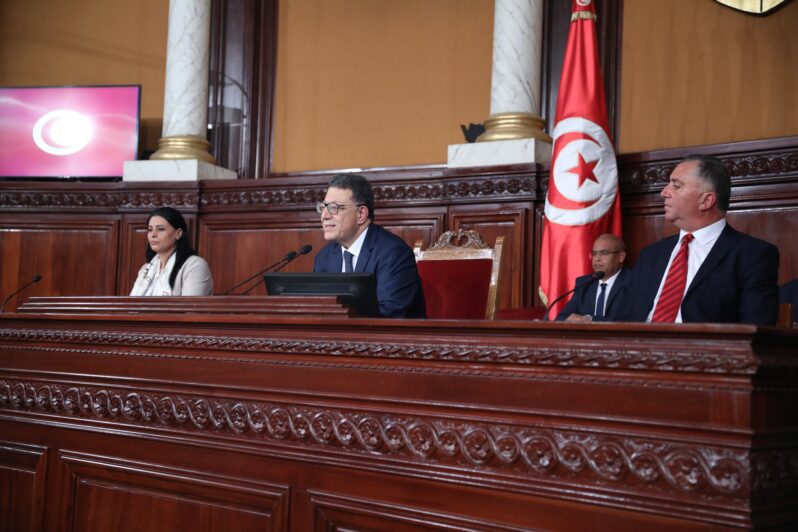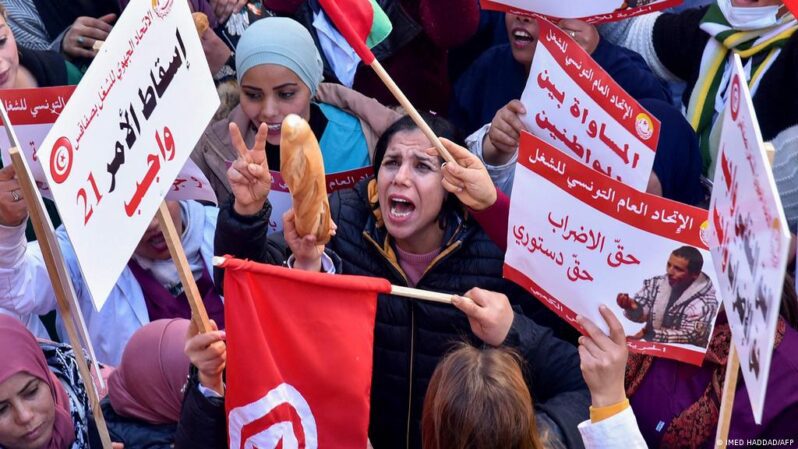Kais Saied’s Parliament Convenes as Bardo Palace Remains Surrounded by Armored Vehicles

On Monday 13 March 2023, Tunisia’s Assembly of the People’s Representatives – the lower chamber of Parliament in President Kais Saied’s “constitution” – held its inaugural session. Some were hoping this moment would officially end the state of exception and the president’s monopolization of power, and mark the resumption of a minimum degree of “democratic life”. However, the proceedings gave a first glimpse of what we very much expected, namely an assembly that – having arisen from an autocratic coup and farcical elections boycotted by most parties – struggles to be anything but a rubber stamp for the president, like most parliaments in despotic systems. It was a session whose course was predetermined by a presidential order and one that private and foreign media was banned from covering in a post-revolution precedent that provoked widespread protest. One of the “deputies” was also ejected by security and arrested pursuant to a warrant, and the president – speaking from Ghardimaou – directly threatened them with recall should they fail to live up to the “new historical stage” he has ushered in.
Ruling Powers Controls Image and Information
The resumption of parliamentary sessions was not enough to open Bardo Palace. The complex – with all its buildings, including the National Museum – has been cordoned off by armored vehicles since the night of 25 July 2021. The security forces remained in place, and journalists not belonging to select public media outlets were forced to camp with their cameras in the opposite square. The National Syndicate of Tunisian Journalists (SNJT) strongly condemned this incident as “part of the authority’s systematic policy targeting journalists and press freedom in order to control and restrict the media and striking citizens’ right to information”. It was a first since the revolution, which liberalized the parliamentary sphere and gradually imposed much transparency in parliamentary work through the pressure and insistence displayed by journalists and civil society organizations since the National Constituent Assembly period. The authority’s aim from restricting access to Parliament to certain public media outlets was to control the image and information. Following July 25, Tunisian National Television became a mouthpiece for the authority’s propaganda, and the latitude for resistance in the newsroom constricted. The same occurred in Tunis Afrique Presse, with the SNJT condemning the policy of censoring and pressuring journalists working there. Meanwhile, private media has been intimidated through arrests and accusations of conspiracy and money laundering – as in the case of Noureddine Boutar, director Mosaique FM, whose editorial line irritates the authority – and prosecutions under Decree no. 54.
The president will not allow the spotlight to be directed at anything that tarnishes the image of his joyous era or is reminiscent of the practices of the parliaments during the “dark decade” preceding his coup. Whenever a debate – however seemingly minor – arose in the session, the cameras focused on the chamber’s ornate ceiling. Since the impression given by the elections and the negotiations to form blocs contradicts the purification of politics that Saied promised to deliver, the solution is to make the assembly a closed chamber.
The President Controls His Parliament
Saied did not leave it up to the inaugural session to set its own agenda. Rather, the agenda was detailed by a presidential order. The “deputies” adhered to it and were not even permitted to take points of order. The president also replaced Parliament’s general secretary days before the inaugural session. This was unsurprising as in Saied’s constitution, the legislative authority is no more than a “function” in which the president has several means of intervening. Its legislative purview is restricted, and the mechanisms of oversight over the executive branch of government are weak, especially motions to censure, which are virtually impossible to pass. The constitution also deprives Parliament of administrative and financial independence and introduces exceptions to parliamentary immunity that could be used to silence any opposition voice within it.
Politically, this parliament is the product of the president’s “path”. Only people “engaged” with this path, whatever their stripes may be, ran for election. Most are people who have political ambitions but lacked the qualifications to play leadership roles in parties during the democratic era. Alqatiba published an investigation into the composition of the “parliament” and concluded that more than half of the new “deputies” have prior party experience, especially in the back rows of Nidaa Tounes. But the wager that Parliament will provide a political opportunity to pressure and oppose the president seems ill-placed. This is not only due to principled reasons (it is the product of a despotic path emanating from an unconstitutional coup) but also because those who ran for election, whatever their motivations may be, are not politically opposed to despotism and will seldom be prepared to wage an open battle with the president.
As for those who might dare to oppose the president, they will be easily deterred either with criminal prosecutions – given the exceptions to immunity and that the judiciary has been intimidated and forced into submission – or the recall mechanism with which the president openly threatened the deputies. His threat confirms what we have repeatedly said, namely that this mechanism’s primary function is not to ensure popular accountability for elected officials but to be a sword hanging above the heads of the president’s opponents.
The result of the elections for the assembly’s speakership is an initial indicator of the balances therein. Former Bar Association president Brahim Bouderbala won as a reward for his loyalty to the president’s path, beating a candidate nominated by the pro-Saied “Victory for the People” coalition, which Bouderbala helped establish. Hence, struggle within the assembly is primarily a struggle over positions among groups that back the president, each seeking to be the ruling regime’s political face. As for the reports about attempts to buy a parliamentary bloc for a “coup” against the president via a constitutional amendment allowing his removal, they are difficult to take seriously and sound like the conspiratorial narratives the authority promotes to justify its systematic targeting of opposition voices, with prosecutions carrying potential death penalties. Saied’s concern about this scenario does not demonstrate its veracity as much as it reflects his obsession with conspiracies and fear of any power slipping out of his hands.



